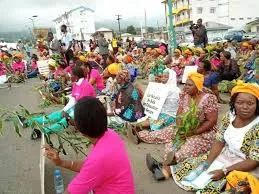Women across Cameroon assemble to mark this year’s edition of the International Women’s Day.
Ahead of this, they had in their respective associations and groups been carrying out activities in tandem with the theme: “Equality for women and men today, for a sustainable development“.
These activities include but are not limited to football games, panel discussions, human investment, and more.
While they focus on creating an enabling atmosphere to enhance gender balance and parity, their counterparts in the Anglophone regions will see it as another day to fight for life.
It would be for them, another day to may be dodge bullets and weep for thousands of their kids that have missed out on classes for the past five years.
The two regions have also due to the crisis, witnessed the highest rates of multiple violations against their gender for the past five years.Attempts to make their voices heard, have only put women in more trouble.
In 2018, when Kah Walla and other women took to the streets on Women’s Day to protest the vices in the Anglophone regions, they were met with brutal repression. Some were detained and only released later.
Separatist fighters too have on their part, been repressive towards the womenfolk. Still fresh in the minds of many, are memories of the brutal torture and murder of female prison warder, Florence Ayafor in 2019.
Several separatist camps too are believed to have have taken hostage underaged girls, making them perform household chores for them. Others are feared to have been sexually violated by the same fighters
Even in seeking peace, women say their voices have largely gone unheard. They say, they have been sidelined from the process.
Although women have frequently been the first to take the risks necessary to promote dialogue across divided communities, as they have attempted in the on-going Anglophone conflict, they are marginalised from taking these initiatives, remarks the Nkafu Policy Institute, a Yaounde-based think tank.
In June 2021, some Cameroonian women petitioned the United Nations, asking its Security Council to put the Anglophone crisis high on its agenda.
Like in past instances where they have sought to pull attention to their cases, some plights have been recurrent. These include giving birth in the bush, being forced into prostitution, unable to go to school, struggling to take care of family and having to deal with harassment of all forms.
Yet, hardly have these been changed by any of the warring parties, and not even government’s much heralded 2019 major national dialogue could do the trick.
At the session, not only were women’s problems carefully avoided, but women too were the most few in attendance. Those present were handpicked from up the line toeing ruling CPDM party.
Women own oppressors?
“Why are the female ministers, parliamentarians, senators, etc, silent about the on-going atrocities perpetrated in the conflict?” This was one of the key questions posed by the Nkafu Policy Institute during an April 2021 session on the armed conflict.
Instead of being at the fore of the resolution process, women in places of power, it is noted, have reclined to the background and chosen to focus on other issues.
A glaring example has been the arbitrary arrest, torture and detention of a pregnant lady in Buea, Antoinette Kongnso.
Despite spending several months behind bars, very few women groups have opted to rise to her defense.
Many have decided to ignore her situation altogether. Despite being granted bail months back, she remains detained on a day meant to celebrate women.
Conversely, the day meant to celebrate the social, economic, cultural and political achievements of women will just be another day for Antoinette and many to remain in pain. While their peers fete, they will only seek to raise their heads above the water and breathe.



